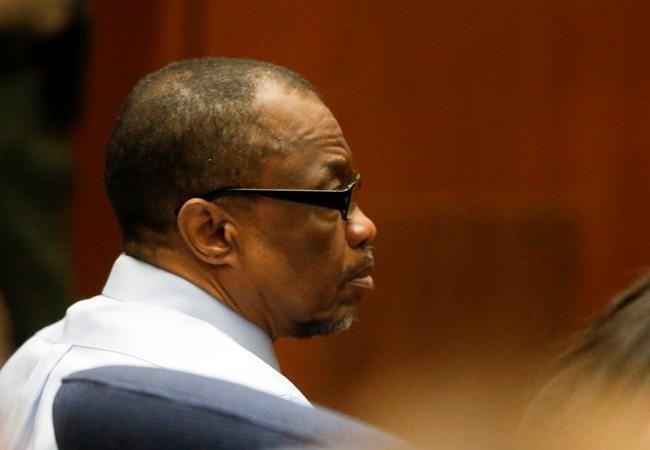
FILE - This May 2, 2016 file photo, Lonnie Franklin Jr., left, appears in Los Angeles Superior Court during closing arguments of his trail in Los Angeles. Prosecutors plans to present evidence of five more killings against Franklin, the man convicted in the "Grim Sleeper" murders, as they begin laying out their case for the death penalty. (Mark Boster/Los Angeles Times via AP, Pool,File)
Republished May 12, 2016 - 7:35 PM
Original Publication Date May 12, 2016 - 12:40 AM
LOS ANGELES - The mother of one of the "Grim Sleeper's" murder victims slowly made her way to the witness stand Thursday, using a cane to steady herself under the grief she's been carrying for nearly 30 years.
Mary Alexander told a jury that will decide if Lonnie Franklin Jr. lives or dies that her life was never the same after her husband told her "our baby's gone," one day in September 1988.
"The hurt is still there, the pain is still there," she testified, acknowledging that at one point she didn't want to live.
In a short opening statement for the penalty phase of the trial, the prosecutor promised jurors they would hear the impact that Franklin's serial killings have had on the families of the victims.
Franklin, 63, a former trash collector and onetime garage attendant for Los Angeles police, was convicted last week of murdering nine women and one 15-year-old girl from 1985-1988 and then between 2002-2007.
Deputy District Attorney Beth Silverman also said they would hear evidence of five additional slayings she said Franklin committed, including one during the apparent hiatus that earned him the moniker.
Silverman said she would present evidence of similar killings connected to Franklin that will expand the range of rage to 1984 and include a slaying from 2000, during the serial killer's so-called "sleep," which police originally attributed to him laying low after one victim survived after being shot in 1988.
Silverman said the gun that killed the final victim in 2007 links Franklin "like bookends" to the killing of the first known victim, Sharon Dismuke, who was found naked in an abandoned gas station restroom in 1984.
The gun that fired the bullets in both killings was found in Franklin's garage after his arrest in 2010.
Evidence connecting Dismuke's killing and others to Franklin came to light after he was indicted.
Most of the killings fit a familiar pattern. Bodies of young, black women were found dumped in alleys, most with gunshot wounds to their chest and strangulation marks on their necks — or both.
Silverman said she didn't charge Franklin with the additional killings because it would have delayed the case that took nearly six years to bring to trial.
She also said a German woman is expected to testify about how Franklin and two other men abducted her when she was a teen in 1974 and gang raped her at knifepoint when he was stationed overseas in the U.S. Army. He was sentenced to more than three years in a German prison, according to court papers.
Defence lawyers declined to present an opening statement at the start of the penalty phase but can do so before presenting their case to spare Franklin's life.
Not long after Silverman promised jurors that they would hear from the families of the dead, the brother, mother and father of Alicia Alexander took the stand. They described the hole left in their lives when the naked body of the 18-year-old was found under a foam mattress in an alley on Sept. 11, 1988. She had been shot and choked.
She was the youngest of five children in the tight-knit family that her brother, Donnell Alexander described as the "Brady Bunch." She was a joy, full of life and outgoing. She was always bringing new friends around the house.
Photos of good family times were projected on a screen, showing a young Alicia on Santa's lap at a mall, striking a ballerina's pose in a white dress and posing with the horse her father bought her. She always seemed to be smiling.
"There's no happy times" now, Donnell Alexander said. "It seemed like when she died my parents died with her."
His father, Porter Alexander Jr., described the "devastating blow" of learning his baby was gone, saying his wife collapsed and has never fully recovered.
He still keeps Alicia's belongs because "she's not gone in my heart."
The father, now 75, regularly visits the cemetery crypt where her remains are held. He had her moved there because he didn't like a tractor running over her grave when it was buried.
___
This story was corrected to show that the killings are alleged to have occurred from 1984 to 2007.
News from © The Associated Press, 2016